Fifth Smart Freight Symposium held at U of T
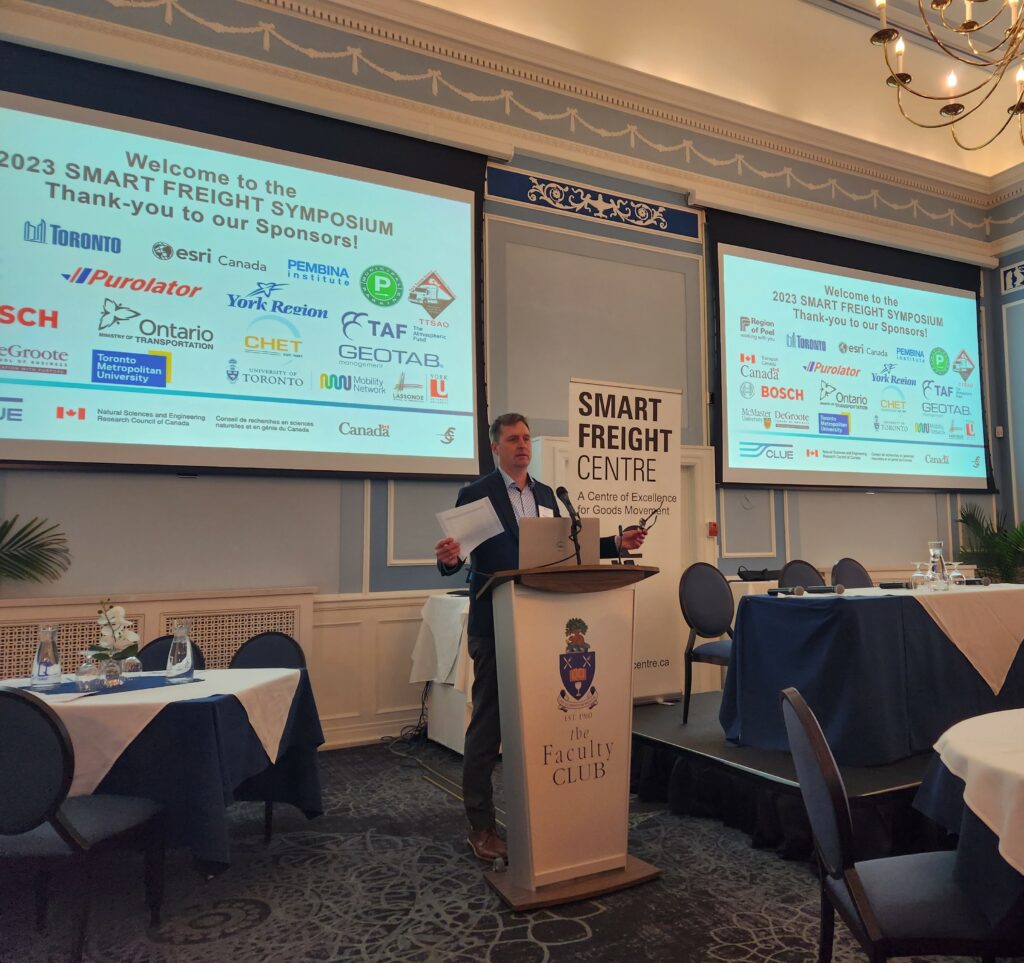
U of T recently hosted the fifth Smart Freight Symposium with over 100 attendees from industry, the public sector, industry partners and universities. This year’s symposium theme of “Transformation in Urban Freight Transportation” saw three sessions, several high-profile speakers and multiple student presentations.
The symposium, held Friday, November 10 at the Faculty Club, involved collaborators from U of T, McMaster University, Toronto Metropolitan University (TMU), York University, with government as well as private sector stakeholders in the Greater Toronto and Hamilton Area (GTHA).
Session 1 – Transforming our cities for freight
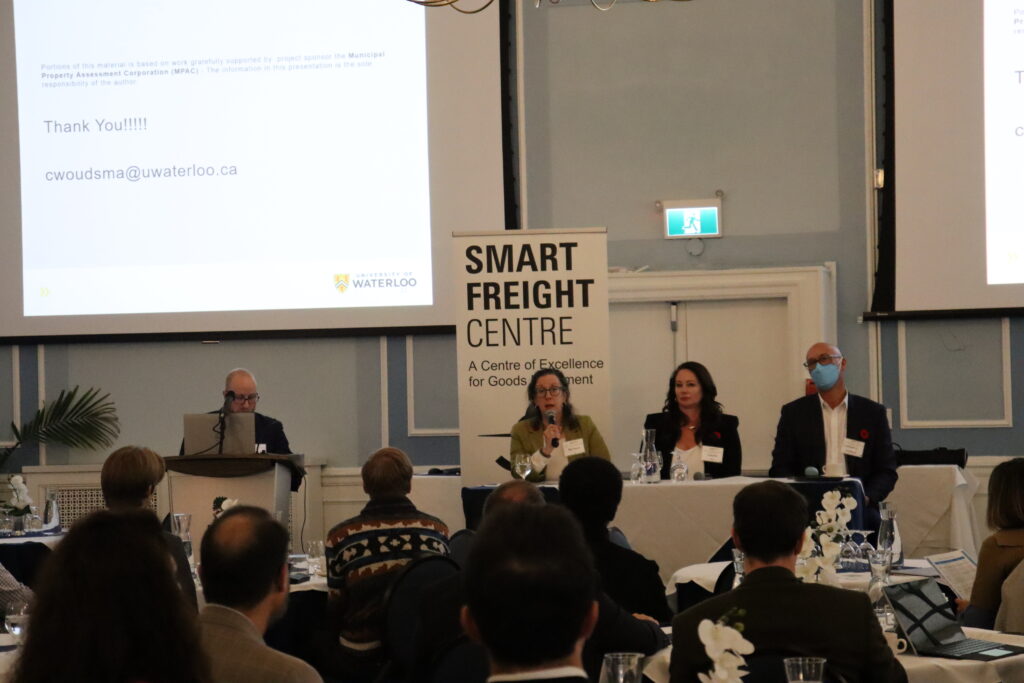
Moderator: Prof. Kevin Gingerich from York University
Prof. Gingerich moderated the first session, which included three speakers from the industry and academia, followed by three graduate student and postdoc presentations.
Speaker 1: Barbara Gray, General Manager of Transportation Services for the City of Toronto
Barbara Gray presented the City of Toronto’s initiatives to increase road safety, improve traffic, and reduce the environmental impact of the freight transportation sector. Some of the initiatives shown include the Purolator microhub, the City’s efforts in adapting regulations for freight needs and delivery vehicle parking, and the importance of working collaboratively with partners.
Speaker 2: Laurie Weston, General Manager of E-Commerce at Purolator
Laurie Weston talked about Purolator’s initiatives and efforts to realize the company’s goal of being the greenest courier company in Canada while improving customer satisfaction. The Purolator Urban Quick Stop in Toronto, Mobile Quick Stops, downtown mini-warehouses in Ottawa, and the more than 2700 customer access points around Canada are some examples the company has put in place to consolidate freight and improve customer accessibility.
Speaker 3: Clarence Woudsma, Professor at the University of Waterloo
Prof. Clarence Woudsma provided an overview of different kinds of logistic spaces in urban areas and how they change or evolve due to several factors. Some drivers of change in city logistic spaces include weather disruptions, automation of logistic spaces, the need for distribution centers to be closer to retailers and customers, and the shift towards “Just-in-Case” inventory.
Student/ Postdoc Presentations:
- Carlos Rivera, a Postdoc at UofT, presented on the interaction between land use and transportation. He developed a facility location model based on the fact that the location of distribution centers significantly impacts the supply chain and that supply and demand are inherently interconnected.
- Farzan Moosavi, a Ph.D. student at TMU, presented his work on on-demand multi-modal last-mile delivery using adaptive network planning. He showed his real time dynamic simulation and how adaptive network architecture was used to develop a last-mile delivery system using sidewalk robots and drones.
- Bahar D’Viniche, a Ph.D. student at York University, shared her research on how drones decrease traffic congestion, provide faster deliveries, and lower operating costs. She also presented the tool “Drone Sidekick”, an interactive tool to explore drone and truck deliveries by allowing users to change the drone range, drone speed, and the number of drones used to assess time savings.
Session 2 – Transforming Freight in Our Communities
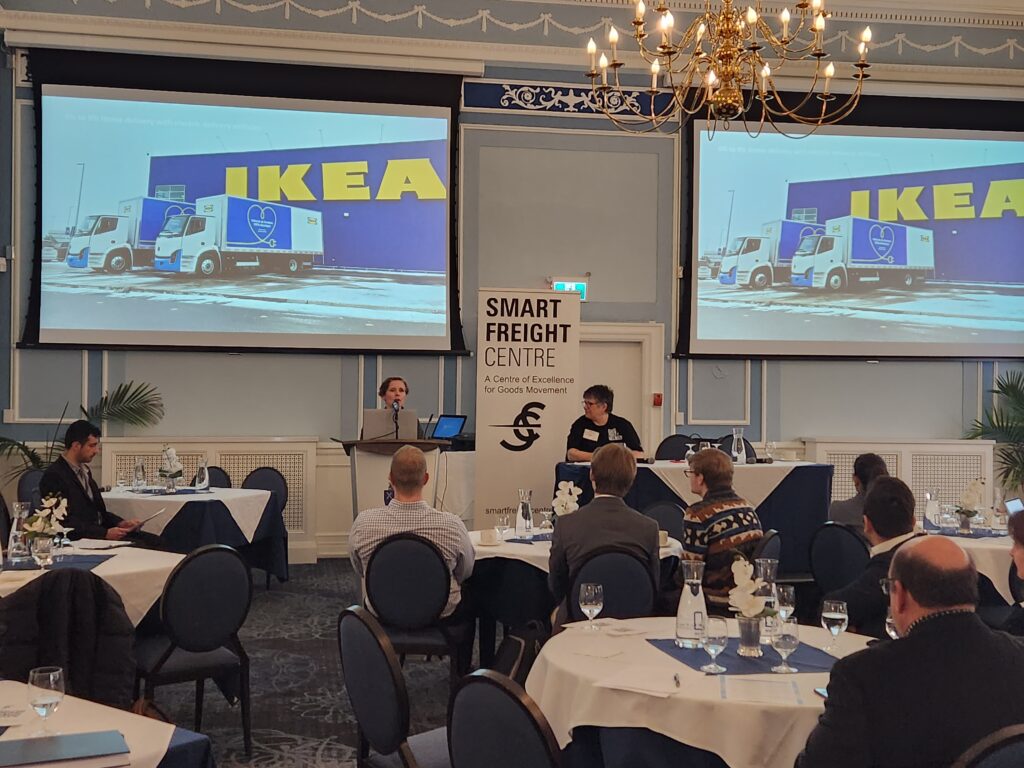
Moderator: Carlos Rivera, Co-chair of the symposium and Postdoc at UofT
Carlos Rivera moderated the second session, which included industry and non-profit sector speakers, followed by four graduate student presentations. The session focused on freight movement and its impact on changing communities.
Speaker 1: Crystal Rasa, Manager of Final Mile and Parcel Delivery from IKEA
Crystal Rasa explained IKEA’s vision and journey towards becoming a net-zero retailer by 2025. She elaborated on the existing challenges and barriers to using innovative technology to meet consumer needs. Rasa further highlighted the importance of increasing customer awareness in managing fleet emissions.
Speaker 2: Barb Willet, Managing Director of Good Foot Delivery
Barb Willet elaborated on the mission of Good Foot Delivery to promote inclusivity, reduce carbon footprint, and empower neuro-divergent couriers’ delivery capabilities. She noted the positive impact of the company’s training program on supporting couriers to better prepare for and land jobs in the future. Willet also discussed Good Foot Delivery’s current business challenges and how they address them.
Student Presentations:
- Milad Saeedi, a Ph.D. student from UofT, presented his work in mapping air quality using last-mile delivery data.
- Sara Torbatian, a Ph.D. candidate from UofT, presented her work on the societal co-benefits of achieving zero emissions in the freight industry’s vehicles. Torbatian et al. developed a holistic approach for comparing and evaluating mitigation plans targeting freight electrification.
- Ella Sherafat, a Ph.D. student from TMU, presented her work on delivery robot-pedestrian interactions in shared urban areas. Her work alleviates the pedestrians’ safety concerns regarding delivery robots’ by improving the robots’ maneuvering algorithm.
- Tamer Deyab, a Ph.D. student from McMaster University, presented his work on creating a sustainable freight network for Canada Post. Deyab et al. developed an optimization framework to help e-commerce merchants meet demand efficiently while supporting Canada Post’s goal of becoming net zero by 2050.
Lunch – Electrification of Trucks Debate

The lunch session, moderated by Professor Matthew Roorda, was an Oxford-style debate with two teams of two students debating whether the electrification of trucks is the most promising pathway for decarbonizing freight.
- Farah Ghizzawi, a Ph.D. Candidate from UofT, and Tamer Deyab, a MASc Student from McMaster University, represented the proposition.
- Elham Heydarigharaei, a PhD Student from York University, and Lina Al Waqfi, MASc Student from TMU, represented the opposition.
During the debate, the proposition team covered myriad rationales including concerns about the global economy, global warming, and greenhouse gas emissions; future affordability of EVs; improved infrastructure; sustainability of the Canadian electric grid; the need for people leading electrification efforts to work together with other organizations who are concerned about human rights; and the desire for quick and ethical action for the younger generation. The opposition team, on the other hand, reasoned that the extraction of lithium requires a large quantity of water which hurts agricultural communities; children are exposed to unsafe conditions mining cobalt for battery production in Congo; batteries are heavy; charging batteries is time consuming; there is a lack of charging stations in rural areas; and electrification is not zero-percent carbon emissions.
The opposition won the debate and received a certificate and monetary prize from the Mobility Network.
Session 3 – Transformational Technology in Freight
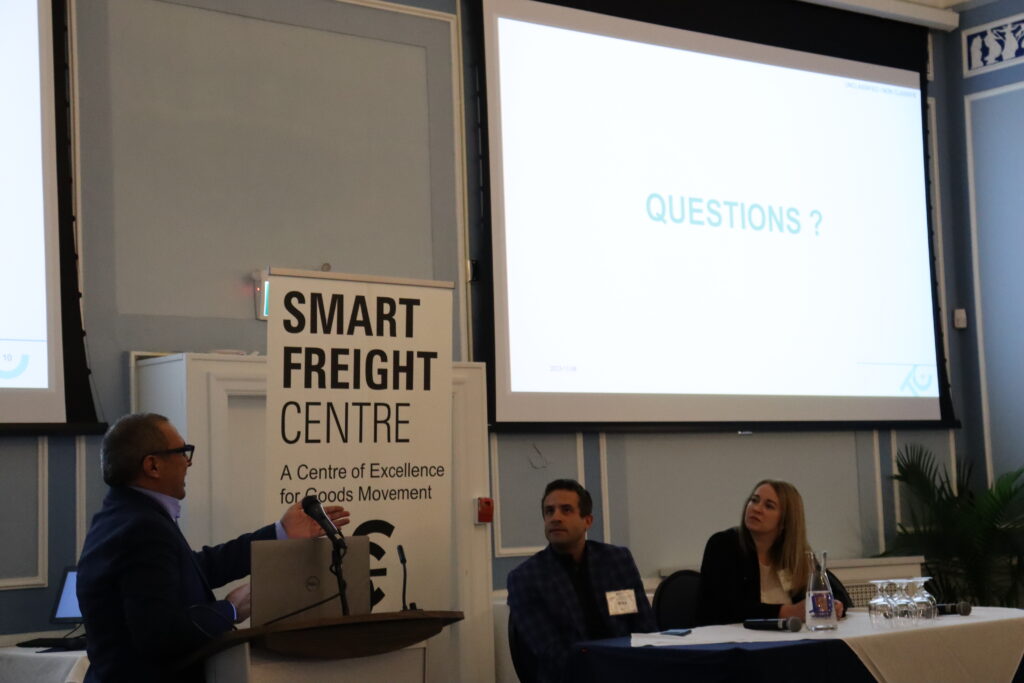
Moderator: Bilal Farooq, Professor at TMU
Dr. Bilal Farooq moderated the third session, which included public sector and industry speakers, followed by five graduate student and postdoc presentations. The session focused on transformational technologies in freight.
Speaker 1: Mike Branch, Vice President of Data and Analytics at Geotab
Mike Branch started the session by providing an overview of freight electrification challenges and emphasized a data-driven approach to determine the best design and location of EV charging stations. He presented a case study on analyzing electrification potential in the Austin MPO. He concluded his presentation with an overview of the use of Generative AI in freight transportation to reduce time to derive insights from the data.
Speaker 2: Amélie Clément, Director in the Transportation and Economic Analysis Directorate at Transport Canada
Amelie discussed the importance and benefits of supply chain digitalization and the government’s role in supporting supply chain digitalization in Canada. She also discussed the private sector industry and academia’s role in fostering supply chain digitalization.
Student/ Postdoc Presentations:
- Ammar Metnani, a Postdoc at Université de Montréal, discussed about parcel deliveries using a mixed fleet of vehicles, including electric vehicles. He also discussed the challenges in managing operations using electric vehicles.
- Kamand Khosravian, a Ph.D. student from York University, presented an EV route navigator tool that can be used to guide the long-haul routing of electric trucks. Kamand also discussed the on-duty regulations and the importance of including them in the EV route navigator tool.
- Tareq Alsaleh, a Ph.D. student from TMU, discussed the importance of supply chain analysis in determining the carbon cost of electrification.
- Xiaozhu Sun, a Ph.D. student from TMU, discussed about intelligent logistics in the rail industry. Xiaozhu highlighted the benefits of the intelligent transport system, including efficiency and environmental benefits.
- Yunhong Tian, a Ph.D. student from UofT, presented a methodology of image recognition for commercial vehicle counting and classification from video cameras.
Conclusion
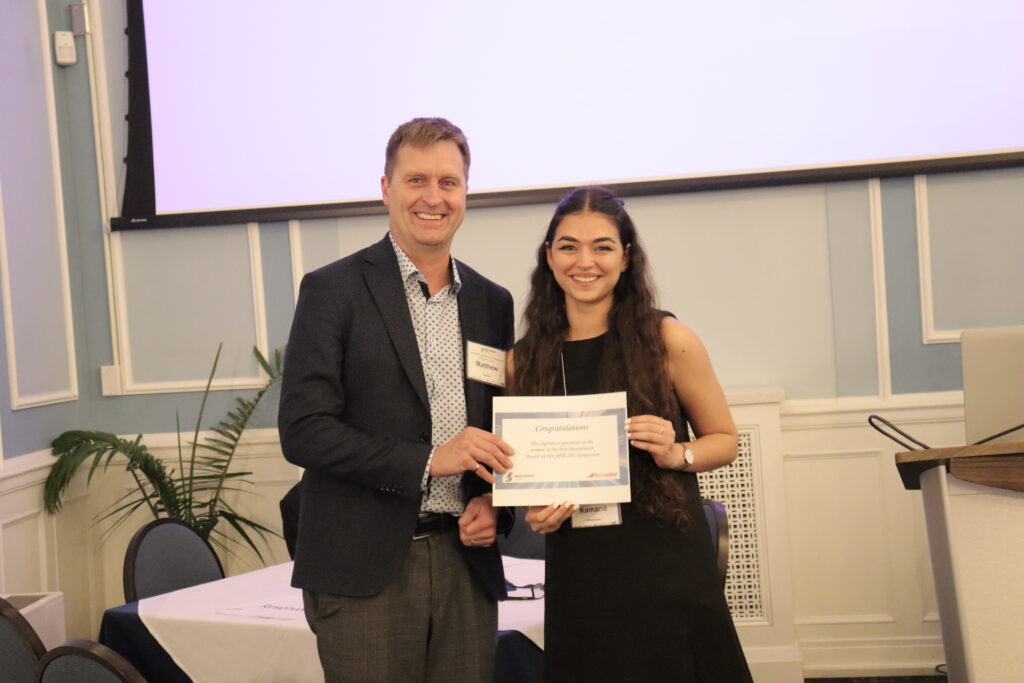
The symposium finished with the presentation of the Best Presentation Award, sponsored by Purolator. The winner and runner-up for the award were Kamand Khosravian from York University and Carlos Rivera from UofT, respectively.
As the symposium drew to a close Dr. Elkafi Hassini, professor from McMaster University and chair of the Smart Freight Centre, gave his closing remarks, thanking all the attendees and organizers of the event.
